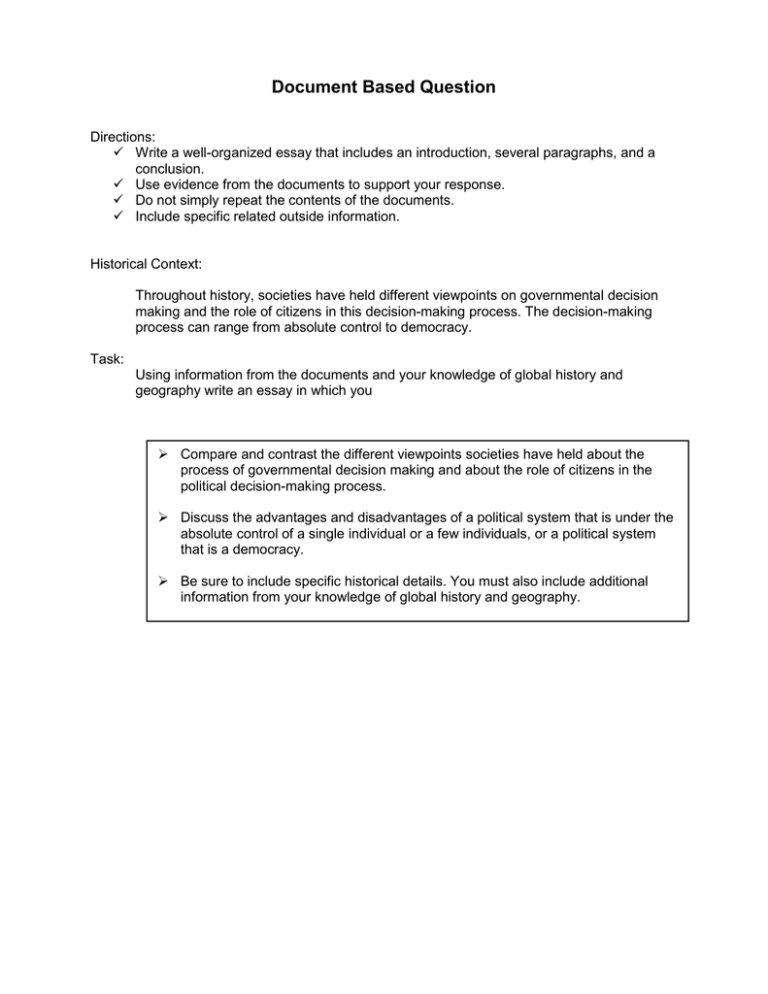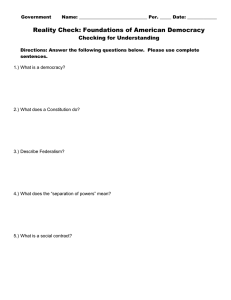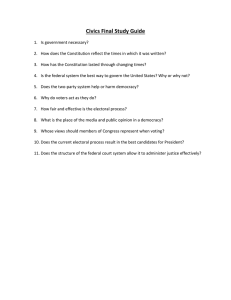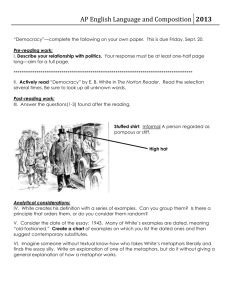Document Based Question
advertisement

Document Based Question Directions: Write a well-organized essay that includes an introduction, several paragraphs, and a conclusion. Use evidence from the documents to support your response. Do not simply repeat the contents of the documents. Include specific related outside information. Historical Context: Throughout history, societies have held different viewpoints on governmental decision making and the role of citizens in this decision-making process. The decision-making process can range from absolute control to democracy. Task: Using information from the documents and your knowledge of global history and geography write an essay in which you Compare and contrast the different viewpoints societies have held about the process of governmental decision making and about the role of citizens in the political decision-making process. Discuss the advantages and disadvantages of a political system that is under the absolute control of a single individual or a few individuals, or a political system that is a democracy. Be sure to include specific historical details. You must also include additional information from your knowledge of global history and geography. DOCUMENTS: Directions: Analyze the documents and answer the questions that follow each document in the space provided. Document 1 The Wise Man's policy, accordingly, Will be to empty people's hearts and minds, To fill their bellies, weaken their ambition, Give them sturdy frames and always so, To keep them uninformed, without desire, And knowing ones not venturing to act. Be still while you work And keep full control Over all. —Lao Tzu (6th century BC) 1. What role does the citizen play in this political system? ____________________________________________________________________________ ____________________________________________________________________________ ___________________________________________________________________________ Document 2 After Socialism, Fascism combats the whole complex system of democratic ideology [theory], and repudiates [denies] it, whether in its theoretical premises [basis] or in its practical application. Fascism denies that the majority, by the simple fact that it is a majority, can direct human society; it denies that numbers alone can govern by means of a periodical consultation [elections], and it affirms the ... beneficial and fruitful [useful] inequality of mankind, which can never be permanently leveled through universal suffrage. —Benito Mussolini, 1932 2. What was the basis of Mussolini's argument against democracy' ____________________________________________________________________________ ____________________________________________________________________________ ___________________________________________________________________________ Document 3 "We are a democracy because the power to make the laws is given to the many rather than the few. But while the law gives equal justice to everyone, it has not failed to reward excellence. While every citizen has an equal opportunity to serve the public, we reward our most distinguished [best] citizens by asking them to make our political decisions. Nor do we discriminate against the poor. A man may serve his country no matter how low his position on the social scale. An Athenian citizen does not put his private affairs before the affairs of the state; even our merchants and businessmen know something about politics. We alone believe that a man who takes no interest in public affairs is more than harmless—he is useless." —"Pericles' Funeral Oration" Athens, 5th century BC 3. According to Pericles, what is a responsibility of a citizen in a democracy? ____________________________________________________________________________ ____________________________________________________________________________ ___________________________________________________________________________ Document 4 "...Whereas ... King James II ... did attempt to undermine ... the laws and liberties of this kingdom... Therefore, the Parliament declares: 1. That the King's supposed power of suspending laws without the consent of Parliament is illegal. 4. That the levying of taxes for the use of the king without the consent of Parliament is illegal. 8. That the king should not interfere with the election of members of Parliament. 13. And that to redress grievances and amend, strengthen, and preserve the laws, Parliament ought to be held [meet] frequently." —The English Bill of Rights, 1689 4. How did the English Bill of Rights change governmental decision making? ____________________________________________________________________________ ____________________________________________________________________________ ___________________________________________________________________________ Document 5 "We the Japanese people, acting through our duly elected representatives in the National Diet [legislature], resolve that never again shall we be visited with the horrors of war through the action of government, do proclaim that sovereign power resides with the people and do firmly establish this Constitution. Government is a sacred trust of the people, the authority for which is derived from the people, the powers of which are exercised by the representatives of the people, and the benefits of which are enjoyed by the people. This is a universal principle of mankind upon which this Constitution is founded. We reject and revoke all constitutions, laws, ordinances, and rescripts in conflict herewith." —The Japanese Constitution of 1947 5. Which universal principle is the basis for the Japanese Constitution? ____________________________________________________________________________ ____________________________________________________________________________ ___________________________________________________________________________ Document 6 “But what happens when the sun sets?” 6. Based on this cartoon, who is the government of France from the mid-1600s to the early 1700s? ____________________________________________________________________________ ____________________________________________________________________________ ___________________________________________________________________________ THEMATIC ESSAY QUESTION January 2004 In developing your answer be sure to keep these general definitions in mind: (a) explain, means "to make plain or understandable; to ,give reasons for or causes of; to show the logical development or relationships of" (b) discuss means "to make observations about something using facts, reasoning, and argument; to present in some detail" Directions: Write a well-organized essay that includes an introduction, several paragraphs addressing the task below, and a conclusion. Theme: Change [Individuals Who Have Changed History] The beliefs and achievements of individuals have changed global history. These beliefs and achievements have had positive and negative effects on society. Task: Identify two individuals who have changed global history and for each: Explain one belief or achievement of that individual Discuss the positive and/or negative effects of the individual's belief or achievement You may use any individual from your study of global history. The individuals you identify must have had a major role in shaping global history and must not be from the United States. Some individuals that you might consider include: Hammurabi Confucius Aristotle Alexander the Great Muhammad Johannes Gutenberg Queen Isabella Leonardo da Vinci John Locke Catherine the Great Simon Bolivar Nelson Mandela. You are not limited to these suggestions. Guidelines: In your essay, be sure to Address all aspects of the Task Support the theme with relevant facts, examples, and details Use a logical and clear plan of organization Include an introduction and a conclusion that are beyond a simple restatement of the Theme





